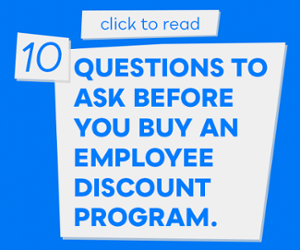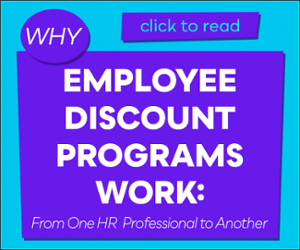Summary:
- The inaugural HR Professional's Stress Index reveals new findings showing the degrees of on-the-job stress that HR workers must endure.
- The study finds that HR professionals working at smaller companies tend to have fewer stressors than their colleagues at larger companies.
- In some key areas, however, there are more similarities than differences in working for a smaller company versus a larger company. #HRStressIndex
About a 4 min. read
The recent release of the inaugural HR Professional’s Stress Index has revealed some interesting findings. Some results were predictable. Other results were a bit of a surprise.
In the “not-too-surprising” category, we learned that the two major stressors are 1) dealing with all the issues related to COVID-19 and, 2) hiring/recruiting in this crazy new world of the "Great Labor Shortage."
These two issues are the most commonly cited for causing grief among HR professionals. We also learned that a burgeoning workload and chronic lack of HR staff are also significant stressors, along with dealing with the demands of executives.
For HR veterans, the results are not too surprising. Anybody who has worked in the profession these past two years has lived that reality. (To review the survey and its results in their entirety, click here.)
Among the results that were a bit of a surprise, we found that HR professionals who habitually stay late had a higher degree of stress versus those who typically go home on time. View the article and associated infographic here: What’s at Risk When HR Professionals Don’t Go Home on Time.
As we slice, dice, and crunch the survey data, we find new and thought-provoking insights into what’s currently causing stress among HR professionals – revealing a few less obvious reasons why your company's "people people" are feeling increased stress and anxiety at work.
Stress and the size of your employer
When we discovered the intriguing results relating to stress and not going home on time, we thought we’d take a closer look at some of the data outliers that appeared after we broke the results down by the size of the company/organization.
We began to see a pattern in the results after asking respondents to rate their agreement or disagreement with a list of value statements. The first column reflects the results for all respondents, but we also broke out the responses by the size of the company. Here are the results:

What we discovered was that HR professionals that work for larger employers were more likely to agree with statements that reflected a higher degree of on-the-job stress or dissatisfaction.
Take, for example, the last question above about having “too many emotionally charged confrontations as compared to most HR professionals.” While overall 19 percent of professionals agreed with that statement, we see that number steadily increase as the number of employees grows. From 15 percent for small companies to 18 percent for medium-sized companies to 24 percent for large companies with a thousand or more employees.
This is a statistically significant difference between small and large companies, so it prompted us to take a deeper dive into these interesting results to see what else we would find.
After comparing answers from respondents working at small companies (defined as having 75 employees or less) versus larger companies (those with 250 employees or more), we discovered that HR professionals working at small companies...
- Are 50 percent more likely to go home on time.
- Are 41 percent more likely to report their employer is committed to work/life balance.
- Have 35 percent fewer emotional confrontations at work.
- Are 31 percent more likely to be satisfied with their company’s wages & salaries.
- Are 30 percent more likely to report their company has created a positive work culture.
- Have 34 percent fewer disciplinary matters to deal with.
- Are 26 percent less likely to feel job-related stress about dealing with executive demands.
- Are 17 percent more likely to look forward to coming to work.
- Are 14 percent more likely to report they are satisfied with the work they do.
Along those same lines, we find HR professionals working for larger employers are...
- 82 percent more likely to report they are lacking enough HR staff.
- 44 percent more likely to report they can’t keep up with their existing workload.
- 35 percent more likely to be dissatisfied with the company’s work/life balance
- 34 percent more likely to have “too many emotional confrontations” at work.
- 23 percent more likely to agree that their company doesn’t offer competitive wages.
- 19 percent more likely to report their company “cultivates a false narrative.”
- 17 percent more likely to have used their company’s EAP/mental health services.
- 14 percent more likely to report they work in a toxic environment.
It may stand to reason that for any type of large organization, the more people you have to deal with, the more likely you are to encounter someone that causes you stress and anxiety. The same principle applies to HR departments. And while working for a large company can often provide benefits that a smaller company can’t afford to offer, that doesn't mean that larger companies always have the advantage.
When the size of your company doesn’t matter
While the above findings show a correlation between smaller companies and less stress, we also found responses where the statistical differences were roughly within the survey’s margin of error. They include the following: (Small company percentage listed first)
- I feel significant job-related stress about recruiting and hiring (84 percent vs. 86 percent)
- I have a good relationship with the employees at my company (79 percent vs. 76 percent)
- I believe HR has a seat at the strategic table at my company/organization (63 percent vs. 62 percent)
- My company is truly committed to diversity, equity, and inclusion (42 percent vs. 44 percent)
- I feel job-related stress about open enrollment (39 percent vs. 41 percent)
- I feel job-related stress about layoffs/right-sizing (41 percent vs. 43 percent)
- I often consider getting a new job outside of HR (36 percent vs. 37 percent)
One final note of caution. Although we find a higher statistical correlation between specific stressors at larger employers, it’s important to remember: correlation does not imply causation. Simply working at a larger company will not necessarily cause you greater stress. In fact, the opposite may very well be true. However, our study has identified a statistical correlation between larger companies and a higher likelihood of encountering circumstances that may contribute to stress among HR professionals. As always, your results may vary.
Join the Conversation
What’s your take on these findings? Have you worked at both a large and small company and found a difference in your stress levels? Start the conversation or add your insights below.





